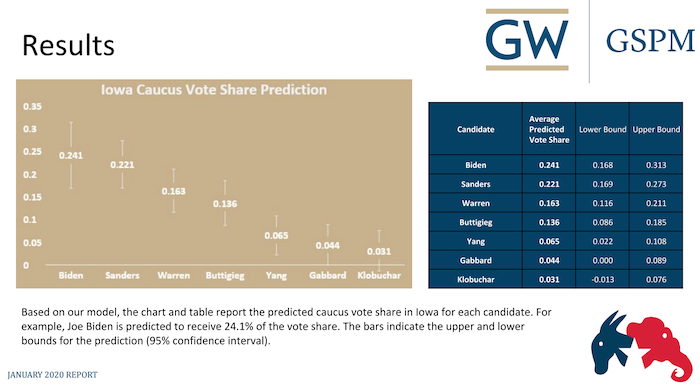MEDIA CONTACTS:
Jason Shevrin: jshevrin gwu [dot] edu (jshevrin[at]gwu[dot]edu), 202-994-5631
gwu [dot] edu (jshevrin[at]gwu[dot]edu), 202-994-5631
 gwu [dot] edu (jshevrin[at]gwu[dot]edu), 202-994-5631
gwu [dot] edu (jshevrin[at]gwu[dot]edu), 202-994-5631Timothy Pierce: tpie gwu [dot] edu (tpie[at]gwu[dot]edu), 202-994-5647
gwu [dot] edu (tpie[at]gwu[dot]edu), 202-994-5647
 gwu [dot] edu (tpie[at]gwu[dot]edu), 202-994-5647
gwu [dot] edu (tpie[at]gwu[dot]edu), 202-994-5647WASHINGTON (Jan. 30, 2020)—A new election prediction model, which incorporates Twitter data, campaign finance records and endorsement counts, predicts former Vice President Joe Biden will win the Iowa Democratic caucuses on Feb. 3.
The new model was developed by researchers at the George Washington University’s Graduate School of Political Management (GSPM), who aim to forecast the results of numerous presidential primary elections as well as the 2020 presidential and congressional elections.
The Iowa caucus model projects Mr. Biden will achieve a narrow victory with 24.1% of the vote share. Sen. Bernie Sanders is expected to land in second place with 22.1% of the vote, followed by Sen. Elizabeth Warren (16.3%), and former Mayor Pete Buttigieg (13.6%).
"This groundbreaking prediction model that incorporates the conversational echoes on Twitter offers researchers a promising new approach towards understanding the dynamics of presidential nominations,” GSPM Director Lara Brown said. “We are encouraged by our initial findings and look forward to updating our models as we move through the first four contests in February."
The model’s unique formula considers three factors: Twitter mentions, cash on hand and endorsements. The amount of Twitter mentions reflects the attention a candidate garners among the wider electorate as well as the effect important opinion leaders have on the online political discussion. Cash on hand quantifies the financial position of a candidate and demonstrates the level of donor commitment. The number of endorsements is a relative indication of a candidate’s strength within the party. A complete description of the model’s methodology can be found online.
The GW election prediction project is the first of its kind that takes into account the number of times a candidate’s name is mentioned on Twitter. The inclusion of quantifiable Twitter activity provides a more holistic measurement of public opinion about the 2020 presidential campaign.
"Although multiple models demonstrated a good fit with the campaign data, the final model displayed exceptional parsimony and low error when predicting polls for 2020, while still retaining a high ability to model the 2016 and 2012 caucus vote,” Meagan O’Neill, GW’s lead research scientist for the new model, said. “Twitter mentions were particularly able to provide improved predictions not captured by the fundamental factors."
The 2020 election prediction model project is an initiative of GSPM’s Public Echoes of Rhetoric in America (PEORIA) Project, which strives to quantify how voters react to campaign messages. Model projections will be published periodically throughout the 2020 campaign.
-GW-


